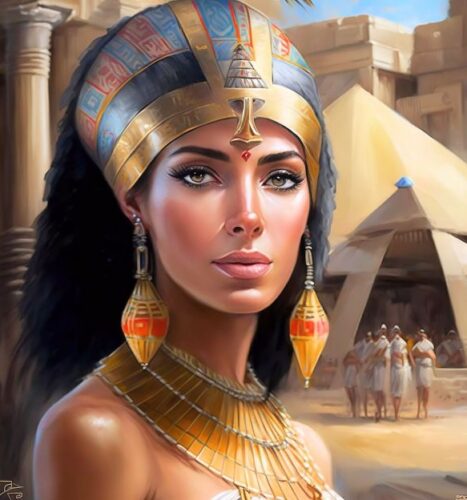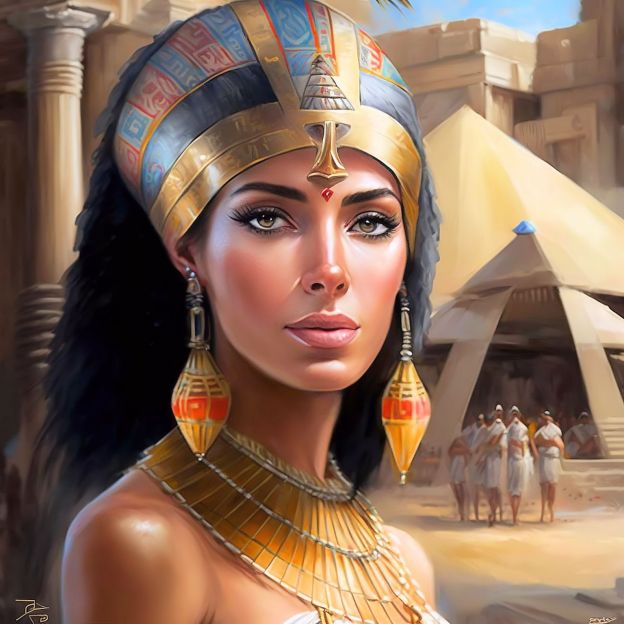
Queen Cleopatra of Egypt, a short article that narrates the story of Cleopatra and her life with references to her famous career in literature, theater, and film industry.
Nay, pray you, seek no color for your going, But bid farewell and go. When you sued staying, Then was the time for words. No going then! Eternity was in our lips and eyes, Bliss in our brows’ bent, none our parts so poor But was a race of heaven. They are so still, Or thou, the greatest soldier of the world, Art turned the greatest liar.
William Shakespeare, Antony and Cleopatra
Cleopatra occupied a dangerous position in the ancient world, a position that is still dangerous in modern society: a powerful woman. Roman leaders launched a smear campaign against her, and its enduring success stained the image the world had of Cleopatra. Instead of brilliant and powerful, she was cast as evil, lustful and wild.
Mallory O’Meara
If you find him sad, say I am dancing. If in mirth, report that I am sudden sick.
William Shakespeare, Antony and Cleopatra
Apollodorus came, Caesar saw, Cleopatra conquered.
Stacy Schiff
Her passions are made of nothing but the finest part of pure love; we cannot call her winds and waters, sighs and tears; they are greater storms and tempests than almanacs can report…
William Shakespeare
As a famous historian once said, in all its history, Rome deigned to fear two people; one was Hannibal, the other was a woman.
Karen Essex
Queen Cleopatra of Egypt was one of the most important figures of antiquity. Born in 69 BC, Cleopatra was the daughter of King Ptolemy XII and Queen Cleopatra V. When Cleopatra’s father died in 51 BC, she and her brother Ptolemy XIII assumed the throne together. However, their relationship was turbulent, and in 48 BC. Cleopatra was forced to flee Egypt after being challenged by her brother and her advisor Pothinus.
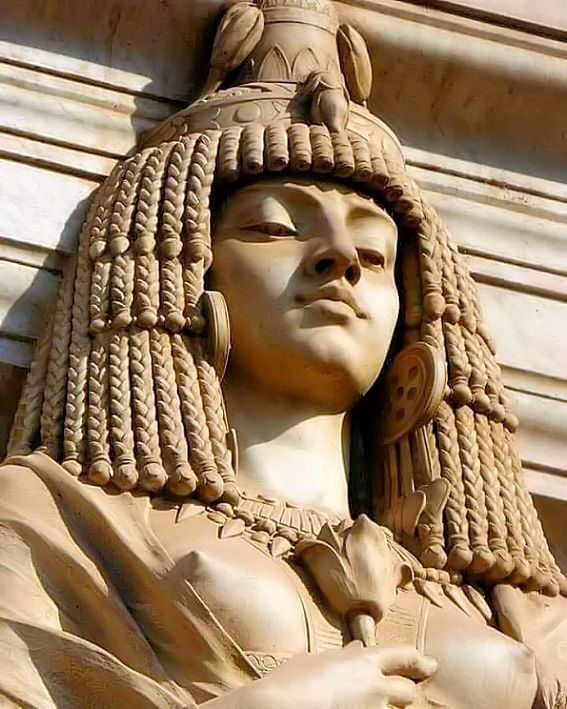
Seeking allies, Cleopatra met with Julius Caesar, who was in Egypt at the time, and she is said to have seduced him to gain his support. Caesar helped Cleopatra regain the throne and the two had a love affair which resulted in the birth of their son, Cesareion.
After Caesar’s death in 44 BC, Cleopatra returned to Egypt and teamed up with Mark Antony, a Roman general who was in control of the eastern part of the Roman Empire. Their love affair was highly publicized and Cleopatra became an influential figure in Roman politics.
However, their alliance against the new Roman leader, Octavian, resulted in Antony’s defeat at the Battle of Actium in 31 BC. Cleopatra, fearing capture by Octavian, decided to commit suicide. She is said to have died by poisoning herself with the venom of an asp.
Cleopatra is remembered as one of the most intelligent, ambitious and seductive women in history. Her relationship with Cesare and Antonio has inspired numerous literary, artistic and cinematic works over the centuries.
Cleopatra, the last queen of ancient Egypt, had also a strong connection to the pyramids of Egypt. However, it is important to note that Cleopatra lived several centuries after the construction of the pyramids, so she did not play a direct role in their creation.
One of the ways in which Cleopatra was connected to the pyramids was through her family’s history. Cleopatra was a member of the Ptolemaic dynasty, which ruled Egypt for several centuries after Alexander the Great’s conquest of the country in 332 BCE.
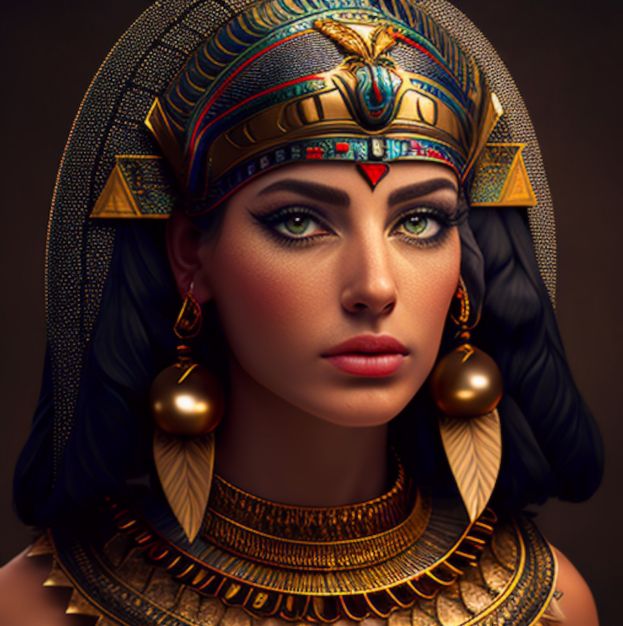
The Ptolemies saw themselves as the legitimate heirs of the pharaohs of ancient Egypt, and they made a point of associating themselves with Egypt’s ancient culture and heritage. As part of this effort, they sponsored the restoration of several ancient monuments, including the pyramids.
One of the most famous stories about Cleopatra and the pyramids involves her relationship with Julius Caesar. According to legend, Cleopatra smuggled herself into Caesar’s palace in Alexandria by being wrapped up in a carpet. When she emerged from the carpet, she presented herself to Caesar as a gift from Egypt. Some versions of the story claim that she did this in the Great Pyramid of Giza, although there is no historical evidence to support this claim.
Overall, while Cleopatra did not play a direct role in the construction or maintenance of the pyramids, she was a member of the royal family that saw itself as the inheritors of Egypt’s ancient heritage, and she was closely associated with the pyramids through her family’s patronage of ancient monuments and her famous connection to Julius Caesar.
The figure of Cleopatra is also a character of great importance and fascination in world literature, and in particular in the two tragedies by William Shakespeare, “Julius Caesar” and “Anthony and Cleopatra”.
In Julius Caesar, Cleopatra appears as a secondary character, but her presence is central to the plot. The love relationship between Cleopatra and Caesar, in fact, is one of the triggers of the Roman civil war that leads to the fall of the empire. In the drama, Cleopatra is presented as intelligent, ambitious and seductive, but also manipulative and impulsive.
In “Anthony and Cleopatra”, however, the Egyptian queen is the main character and she is presented in a more complex and multifaceted way than in the previous tragedy. Here, Cleopatra is described as a mature, intelligent and passionate woman who has a strong influence on the Roman general Mark Antony. Their tumultuous and tragic relationship is the focus of the piece, which explores the themes of love, politics and death.
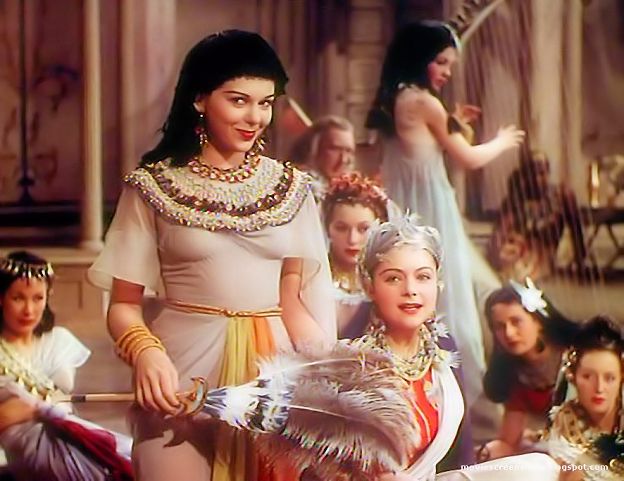
In Shakespeare’s two tragedies, the figure of Cleopatra represents the charm of the East, beauty, seduction and ambition, but also the strength and intelligence of a woman who tries to protect her homeland and her people since the Roman conquest. Cleopatra represents the essence of Shakespearean tragedy, in which the characters are challenged by their passions and ambitions, and their downfall is inevitable.
In general, the figure of Cleopatra in Shakespeare’s plays has been interpreted as an embodiment of female beauty and seduction, but also as a symbol of political power and resistance against the Roman conquest. Her figure has influenced many subsequent writers and artists, becoming an icon of popular culture.
Furthermore Cleopatra has been the protagonist of numerous films, some of which have become famous for their grandeur. Here are some of the most famous films dedicated to the Egyptian queen:
“Cleopatra” (1963), directed by Joseph L. Mankiewicz and starring Elizabeth Taylor as Cleopatra, Richard Burton as Mark Antony and Rex Harrison as Julius Caesar. This film was one of the most expensive in the history of cinema and tells the story of Cleopatra and her relationship with the two Roman genres.
“Anthony and Cleopatra” (1972), directed by Charlton Heston and with Heston himself in the role of Mark Antony and Hildegard Neil in the role of Cleopatra. This film is based on Shakespeare’s tragedy of the same name and tells the tumultuous love story between Cleopatra and Mark Antony.
“Cleopatra” (1917), directed by J. Gordon Edwards and starring Theda Bara as Cleopatra. This film is one of the first to have represented the figure of Cleopatra in cinema and is considered a classic of silent cinema.

“The Great Colossus” (1962), directed by Sergio Leone and starring Rory Calhoun as Mark Antony and Georges Marchal as Caesar. Although not a film specifically dedicated to Cleopatra, this film tells the rise and fall of Caesar, with an important presence of Cleopatra.
These are just some of the most famous films dedicated to Cleopatra, but there are many other productions that have told her story or represented her as a secondary character.
To find out more about women you can also read:

